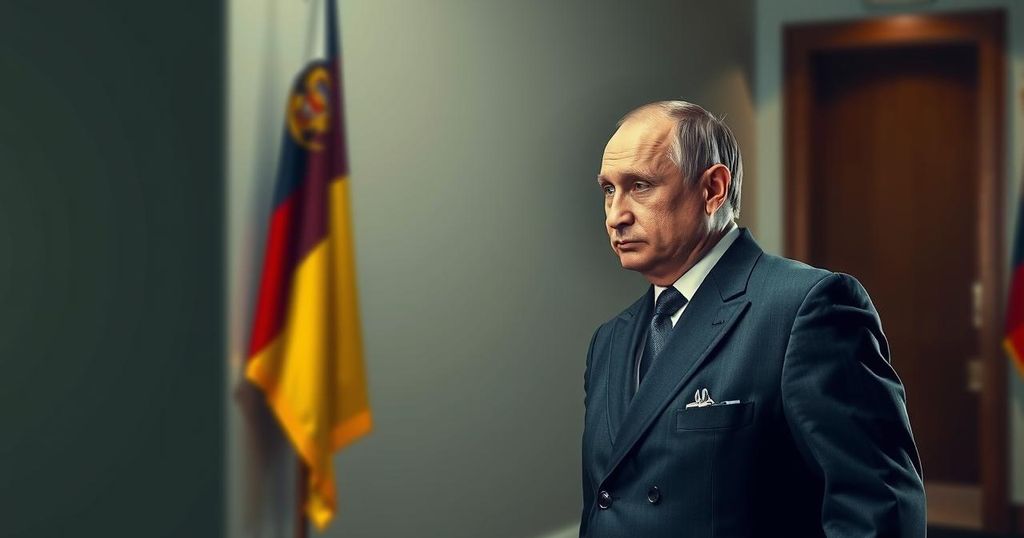Maxim Shugalei: The Dilemma of Russia’s Influencer in Africa and His Recent Detention

Maxim Shugalei, a Russian operative closely associated with the Wagner Group, faced arrest in Chad alongside two colleagues, raising questions about Russia’s influence strategies in Africa. Known for orchestrating disinformation campaigns and having historical ties with significant Russian figures, Shugalei’s detention complicates the Kremlin’s ambitions within the continent, especially amid its efforts to diminish Western influence.
Maxim Shugalei, often portrayed as a formidable Russian operative dedicated to promoting Moscow’s interests in Africa, recently faced a significant setback when detained in Chad alongside fellow operatives Samer Sueifan and E Tsaryov. Their unexplained arrest in September resulted in their return to Russia earlier this month, as confirmed by the Russian embassy. Shugalei, who labels himself as a sociologist, is recognized as a prominent figure in Russia’s influence operations across Africa, particularly in collaboration with the Wagner Group, a notorious association of Russian mercenaries.
Shugalei’s career traces back to his affiliation with Yevgeny Prigozhin, the deceased leader of Wagner and a close associate of President Vladimir Putin. Recently under European Union sanctions due to his orchestration of disinformation campaigns to bolster Wagner’s presence in Africa, he gained notoriety during his arrest in Libya for espionage while aiding the Gaddafi regime. His exploits were later dramatized in a trilogy of films that aimed to glorify Wagner’s operations. Despite his portrayal as a heroic figure, Shugalei’s operations often involved controversial activities, such as attempting to bribe candidates during elections in Madagascar.
Since Prigozhin’s demise, recommendations suggest that Shugalei has maintained a foothold within the Russian influence landscape, albeit his current operations remain uncertain following his arrest in Chad. The circumstances surrounding this detention remain unclear; however, reports suggest potential motivations may range from concerns over Shugalei’s disinformation capabilities to geopolitical maneuverings with Western influence. Although he has previously avoided recognition of his ties to Wagner, recent activity on Telegram indicates a shift, highlighting his allegiance to Prigozhin’s legacy and the organization’s recruitment efforts.
Shugalei’s arrest raises questions regarding Russia’s strategic ambitions in Africa. Following Chad’s recent agreements with Russia, analysts speculate about the implications for regional stability and Russian influence, particularly given the historical ties with France that Chad maintains. As the Kremlin aims to consolidate power in the Sahel region, Shugalei’s role reflects the nuanced dynamics at play in Russia’s African engagements, underscoring the complexity of foreign influence within the continent.
Maxim Shugalei epitomizes the role of Russian operatives shaping influence in Africa. His extensive ties to Yevgeny Prigozhin’s Wagner Group place him at the center of disinformation strategies promoting Russian interests abroad. As a figure balancing PR campaigns and operational support, Shugalei’s activities have attracted international scrutiny, particularly with the imposition of sanctions from the EU and Ukraine due to his involvement in covert actions supporting Moscow’s geopolitical aims. His arrest in Chad amidst ongoing efforts for Russia to establish a foothold in the continent signifies not only a potential setback for his operations but also unveils the complexities of Russia’s engagement in Africa amidst shifting power dynamics.
The case of Maxim Shugalei illustrates both the precariousness of foreign influence operations in Africa and the intricate interplay between local and international political interests. His recent arrest in Chad, shrouded in ambiguity and surrounded by various speculations, raises critical questions about the effectiveness of Russian strategies in the region and highlights the ongoing challenges faced by operatives like Shugalei. As geopolitical influences evolve, the implications for Russia’s presence in Africa remain significant, particularly in light of its aspirations to replace traditional Western alliances.
Original Source: www.bbc.com








